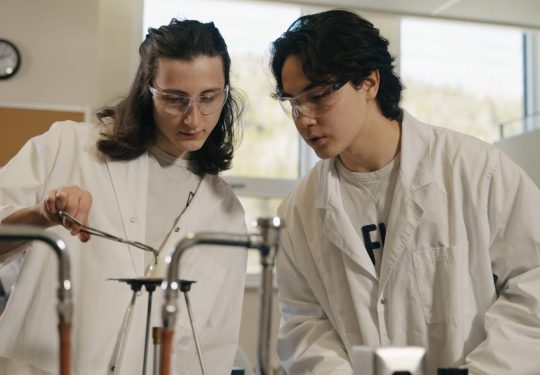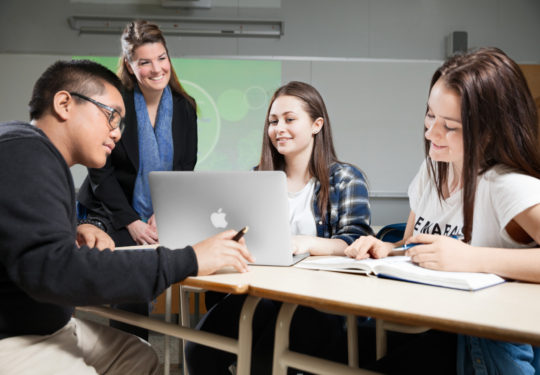Social Science, Individual and Society Profile
- Diploma : Pre-University
- Duration : 2 years
- Quota : No
- Program Code : 300.3i
Program with the possibility of a $15,000 scholarship: Learn more
Program description
You are interested in learning more about the world, societies, and human relations? Come and explore the issues affecting humans with the support of a dynamic team. Develop your critical thinking to gain a better understanding of the world that surrounds you. Build a solid foundation for yourself as you prepare for university.
Choosing to Study Here
- Become involved in research experiences that give you a chance to put into practice what you are learning and make the most of your intellectual energy.
Take part in meaningful field trips that stimulate authentic learning.
Become involved in a humanistic educational project that helps you build psychosocial aptitudes.
Build language skills to be able to communicate better verbally and in writing.
Second Language Immersion
Take your courses in French and in English, and get individual coaching.
Adventure-Studies
Combine weekly outdoor activities with your courses and obtain sports certifications at the end of your studies.
Your University Studies
The university programs available to you with a DEC in Social Sciences are:
- Social science (politics, economics, history, psychology, geography, sociology, philosophy, criminology, law);
- Communications (communication, journalism, public relations, cinema, television);
- Education (pre-school, primary school, secondary school teaching, special education);
- Intervention (psychology, psychoeducation and educational counseling, social work, vocational and career counseling, sexology, industrial relations);
- And many other fields.
Course Schedule
First Semester
22 hours/weekAcademic Work Methods in Social Science 300-303-GA
This course addresses the basis of intellectual work methods specific to the program with a multidisciplinary perspective. This is required to acquire skills such as: reading and understanding social science texts, researching, and evaluating documentation in an academic context, using valid research methods, while working in a team environment.
This course also aims to contribute to the development of the thinking and analytical skills of students in the field of Social Science as well as to the training of their critical thinking and the stimulation of their intellectual curiosity. In addition, it promotes the acquisition of methodological know-how that will serve them throughout their academic career.
Introduction to World History Since the 15th Century 330-304-GA
This course will develop students’ understanding of human history by exploring the transformations of different societies through encounters, interconnections, cultural transfers and conflicts with each other since the last six centuries.
This course is designed to provide a global historical perspective through the lens of different civilizations (Indian, Chinese, Western, African, etc.), by studying individual civilizations and situating them in the world context to shed light on how these civilizations had an influence on other societies.
Introduction to Psychology 350-333-GA
This course aims to introduce students to the scientific basis for the study of human behaviour and the underlying mental processes. It also seeks to develop an awareness of the interaction of factors that influence the overall functioning of individuals. The course provides an exploration of the fundamental theoretical principles that will serve as a foundation for further exploration of different areas of psychology.
The knowledge of these basic notions will contribute to the formation of scientific thinking through which students will develop improved critical thinking skills, enabling them to distinguish between popular and scientific psychology.
By the end of this course, students will be able to explain patterns of human behaviour and mental processes from a psychological perspective.
Individual and Society 387-333-GA
Roughly speaking, sociology is the study of society, its components and how individuals interact within a social context. The Individual and Society course is designed to introduce and provide students with a sociological perspective and knowledge that will serve them throughout their journey in the Social Science program and, hopefully, in their civic life. A variety of contemporary social phenomena will be analyzed through the lens of different concepts and important sociological theories. Throughout the course, students will be made aware of the influence of social dynamics that influence both the individual and society. Using a sociological approach, they will have the opportunity to interpret one or more of the issues that society is currently facing.
Physical Activity and Health 109-101-MQ
This course focuses on the relationship between physical fitness, healthy, and active lifestyle and health. You will have to experiment with one or a few physical activities and relate them to your ability to adapt to exercise, your needs to change or maintain your physical condition, your motivation, your lifestyle habits, and your knowledge regarding prevention, in order to make a relevant and justified choice of physical activities.
Introduction to College English 603-101-MQ
Introduction to College English is designed to help students make the transition from high school English courses and to improve their writing and analytical skills necessary for college English. This course serves as the basis to the organizational and interpretative skills required in the other three courses of English.
One aim of the course is to explore works of literature in detail and, on a cultural level, attempt to find their relationship to our world and our lives. Students are encouraged to read and respond to literature on both a literal and metaphorical level. Students will be reading short stories and examining the literary elements necessary to critical thinking and analysis. This proficiency in the literary elements allows students to take a concrete approach to literary analysis and these skills will continue to be developed in the other two literature courses.
The second goal of the course is to learn to organize ideas, in the form of a formal essay, to develop a focused thesis statement, to write in a coherent and organized style, and support arguments and explanations with appropriate references to the literary text. To achieve these goals students will be required to adopt a writing process wherein they outline their essay, write a rough draft, and proofread and edit their work. To this end, the course will emphasize practical written work including grammar exercises and editing skills. As well, students are encouraged to develop their reading comprehension skills, to present their ideas in class discussions, and to continue to improve their writing style.
French S.L. Common GE 602-1xx-MQ
Description to come.
Second Semester
26 hours/weekQualitative Research and Methods in Social Science 300-222-RE
This course will introduce you to research in Social Science, where you will develop the core skills necessary to carry out qualitative research in this field.
Through teamwork, you will experience all the stages of qualitative research in the social sciences: selection of a topic, development of a problem, use of a qualitative data collection method, data analysis, interpretation of findings and communication of research results.
This course is also an opportunity to learn more about teamwork (communication, respecting one’s limits and those of others, different ways of working, etc.)
Political Science: Québec and Canada 385-323-GA
This introductory course in political science focuses more precisely on Quebec and Canadian political realities while establishing links with other realities.
This way, you will learn to address the main foundations of political life in today’s society. Among other things, topics covered in this course will include currents of political thought, political institutions and their functioning, and prevailing political issues, all in a spirit of openness and inclusion.
The course also aims to develop your curiosity and interest in our political system as well as to provide you with the knowledge and tools to better understand it.Introduction to Geography 320-323-GA
This introductory course to world geography aims at imparting knowledge and understanding of the world using various thematic maps and a synthesis of different approaches in physical and human geography. We will study geographical notions as various as the place of the Earth in the universe or territorial occupation.
The course is based on a perspective which allows us to understand the human relationships that are forged with space and territory at various scales. The study of the natural and cultural components of the geosphere, along with the analysis of their challenges and solutions, lead students to reflect tangiblyon the society and the environment in which they play a part.
The course also aims to introduce students to the geographical method by initiating them to the analysis and synthesis of geographical sources, while providing the opportunity to work, among other things, on developing their ability to formulate a geographical commentary.
Choice of 1 out of 2 Click here to see
350-353-GA, Human Development: From Childhood to Adulthood
The aim of this course is to explain the main issues and factors that contribute to human development and actualization while depicting the major determinants of the physical, cognitive, emotional and social development of human beings, from childhood to adulthood. Although the course provides an overview of the interaction of different aspects of human development, emotional and social determinants will be more specifically addressed. By the end of the course, students should be able to identify and explain the various theories, concepts and approaches pertaining to each stage of development. They should also be capable of integrating the knowledge acquired throughout the course for a better understanding of the developmental process and its effects on the individual.
387-373-GA, Social Issues and Social Change
This second course of sociology exposes the student to the sociological perspective through the dynamics and the issues of contemporary social change. Among the different topics covered, students may be brought to observe, analyze and discuss issues related to institutional changes (such as within the education system, or the political and economic spheres), the environmental crisis, social inequalities, and many more. Students should also expect to familiarize themselves with social movements: groups of people organizing to defend their ideals and push for social change.
Physical Activity and Effectiveness 109-102-MQ
This course is about the process of improving effectiveness through an objective-based approach in the context of a sport, expression, or outdoor activity. You will need to take an initial survey and assess your skills and behaviors regarding the practice of physical activity, set goals and interpret your progress to improve. This course aims to empower you by taking charge of your apprenticeships required for your improvement in the practice of physical activity.
Knowledge 345-101-MQ
The course Knowledge is about revealing our sources of knowledge. By referring back to the history of ideas, we can better understand how we know what we think we know and how to criticize what we think we know intelligently, thoughtfully, and efficiently. After studying the material throughout the course, students should be able to answer the following questions: How is knowledge acquired? Can we know anything? What can we know?
Literary Genres 603-102-MQ
This course is designed to provide students with a broad perspective of the literary genres selected from different periods of literature. It will examine three literary genres chosen from drama, essay, novel, or poetry, so that students gain an appreciation for different genres of literature. The characteristics of each genre will be highlighted, and students will develop their interpretation skills by recognizing the importance of specific literary conventions in each text. Students will then present their analysis in well-organized literary essays and oral presentations.
French S. L. Applied GE 602-Cx3-GA
Description to come.
Third Semester
26 hours/weekQuantitative Analysis in Social Science 360-223-RE
This course introduces you to the methods of statistical analysis of quantitative data, consistent with the scientific approach. In addition to examining facts from a qualitative perspective, most social science disciplines use quantitative data analysis to characterize human phenomena. To obtain reliable information, data must be collected, processed and presented adequately. This course will teach you how to draw accurate conclusions from statistical data and to identify inconsistent, approximate or flimsy analyses.
Introduction to Economics 383-313-GA
This course introduces the fundamental concepts of economics by exploring various schools of thought, key macroeconomic indicators, and the mechanisms and institutions found in a mixed and open economy.
The primary aim will be to explain the economic principles that guide optimal resource allocation, shaping both individual and collective choices. Additionally, students will acquire a specialized economic vocabulary, develop skills to interpret quantitative data and cultivate a critical perspective on contemporary economic issues.
Choice of 1 out of 2 Click here to see
385-333-GA, Political Regimes and Ideologies
This course is designed to familiarize students with political ideologies and the political regimes in which they operate. While classical ideologies (liberalism, social democracy, conservatism, fascism, nationalism, socialism, etc.) are covered, more recent ideologies (religious fundamentalism, anarchism, libertarianism, feminism, ecologism, etc.) will also be discussed. By learning about both ideologies and political regimes, you will also be able to establish links between these and political headlines.
320-333-GA, Geographical Observatory: Territorial Encounters
This course is designed to help students recognize and understand geographical issues in an applied context (e.g., field study or survey, cultural trip, study tour, immersion or cooperation project, etc.). Territorial encounters – in situ activities – are at the heart of this course, making the human realities of the issues dealt with tangible. To address the complexity of some of these issues, these realities can be explored from both a disciplinary (geographical science) and a multidisciplinary angle. This decompartmentalization allows for a more accurate synthesis of such realities while enabling a multitude of viewpoints to be considered.
In addition to the acquisition of knowledge, particular attention will be devoted to the skills (know-how) and attitudes (life skills) to be acquired and adopted in the contexts of observation or immersion in the field.
Choice of 2 out of 3 Click here to see
350-363-GA, Mental Health: An Integrative Approach
With this course, students will learn to apply the psychological knowledge and methods already acquired in the program to specifically study the phenomenon of mental health. The course aims to demystify and understand the concepts of mental health and mental illness. It introduces students to a range of psychological disorders and the psychological approaches used to explain, prevent or treat them. From an integrative perspective, students will learn how different theoretical approaches contribute to the assessment of explanatory factors in a clinical setting, as well as to the treatment of various psychological disorders, both for prevention and management purposes. In addition to the acquisition of knowledge, this course also encourages students to reflect on themselves and the ways in which they can protect their mental health. It seeks to develop attitudes of openness, objectivity regarding mental health issues and confidence in people’s ability to recover.
387-353-GA, Intimacy and Sexuality: A Sociological Insight
Love, intimacy, sexuality: different topics that may seem deeply personal, but that are still somehow influenced by society and the social experiences of each individual. This sociology course will bring students to reflect on and discuss several social aspects (causes and consequences) of intimate relationships and sexuality. Students will develop a unique and interesting perspective on topics such as: dating and intercourse, managing feelings and emotions, the evolution of intimacy and sexuality through time and how they change across cultures, the influence of the economic and political spheres on people’s relationships, breaking up, LGBTQ realities, the impact of technologies, etc.
300-323-GA, Contemporary Themes: A Multidisciplinary Perspective
This course provides an opportunity for students to gain a unique perspective on the world around them, by reflecting on and analyzing contemporary issues through the lens of various social science disciplines. To that end, students will draw on what they have learned in other multidisciplinary courses in the Social Science program (e.g. Academic Work Methods in Social Science and Qualitative Analysis in Social Science), as well as what they have acquired in the economics, geography, history, psychology, sociology and political science courses. The insights provided by the various disciplines of social science on a given issue open up particularly enriching possibilities for understanding, challenging one’s way of looking at things.
World Views 345-102-MQ
This course allows the student the opportunity to apply the critical thinking skills they have acquired in the Knowledge course to various world views. The course also provides the student with a profound understanding of human beings and human nature by examining various ideologies of individuals, societies, or groups.
Literary Themes 603-103-MQ
This course permits students to explore the central message in literary texts. All texts in the course will expand and reinforce the main theme that has been chosen for the course. The texts will be chosen to include a variety of novels, essays, short stories, and poetry. Students will see a connection between the texts as the theme is explored from simpler to more complex interpretations. The evolution of the course requires that students relate to the literature on a personal level and recognize that not only has the literature developed out of a particular set of values in society, but also that the literature has had an impact on society. It is important that students continue to develop their writing skills and be able to explain the literary devices that support the theme with insightful interpretation and well-organized essays.
Elective course 1 COM-001-03
Description to come.
Fourth Semester
24 hours/weekIntegration of Learning 300-313-GA
This course offers students the opportunity to revisit all the knowledge gained and skills achieved during their time in the Social Science program and to apply them in a new setting as part of a conscious, learning integration process.
This is a multidisciplinary course where students are required to apply their acquired knowledge, critically reflect on their career in the Social Sciences, and mobilize and integrate what they have learned to realize a large-scale project.
This course emphasizes both independent and collaborative work.
Choice of 1 out of 2 Click here to see
101-SH1-RE, Human Biology
In this course, students will develop their knowledge of the anatomy and physiology of the human body, homeostasis and the transmission of hereditary traits in preparation for university studies in psychology or sexology.
By the end of the course, students will be able to describe the interactions between the body’s regulatory and reproductive systems and their effects on behaviour.
387-363-GA, Culture and Media
In our information and technological era, this final sociology course will lead the group to examine the different relationships that can exist between culture and the media. As our social and cultural universe is profoundly marked by technological developments and the expansion of mass media, multiple issues and themes can be addressed: media convergence and concentration, cultural diversification and homogenization, social polarization, social representation of minorities and various social groups, etc. Students will notably be brought to analyze current topics covered in the news.
Choice of 2 out of 4 Click here to see
350-373-GA, Interpersonal Relationship
Offered in the fourth semester of the Social Science program, this course provides an in-depth look at human relationships through psychological concepts and theories. It examines the characteristics of interpersonal relationships, the mechanisms of communication, both the obstacles to and facilitators of relationships, as well as the impacts of these dynamics on our interactions.
The course also includes practical activities designed to develop and refine communication skills. These exercises aim to encourage personal reflection on ways of interacting with others while providing tools to enhance the quality of relationships in various contexts.
383-323-GA, Globalization and Economic Issues
Driven by the spread of economic liberalism and the removal of trade barriers, economic globalization has accelerated. While this global market integration has brought many benefits, it has also created significant challenges, including achieving sustainable growth in the face of the climate crisis, the loss of economic boundaries, vulnerabilities in supply chains, the growing influence of multinational corporations, and rising trade conflicts.
This course introduces students to the economics of globalization, exploring the origins, mechanisms, and impacts of international economic relations. It is designed to equip students with an understanding of how the global economy functions while encouraging critical analysis of key contemporary issues. To provide a deeper understanding and offer practical insights as well as real-world applications, the course includes case studies on the economic approaches of various countries.
201-SH5-RE, Applied Statistics in Social Science
Description to come.
330-313-GA, History Through Film
This course will look not only at the films that have shaped the history of cinema, but also at the cinematographic content itself, to better understand the different eras in which these films were produced.. In this sense, it will serve as a historical source. Finally, historical cinema, by producing culture, influences history, whether as a means of propaganda or counter-power. The course will therefore be an opportunity to approach cinema as a generator of historical phenomena.
Physical Activity and Autonomy 109-103-MQ
This course is designed to help you integrate physical activity into your lifestyle, including better management of the factors that facilitate this integration. During the supervised practice, you will apply the previous apprenticeships by practicing physical activity regularly and sufficiently from a health perspective, on the one hand, and by planning, carrying out and evaluating a personal physical activity program that you have the opportunity to practice and validate under the supervision of the teaching staff, on the other.
Humanities in Social Science 345-C13-GA
Description to come.
English: Pre-University 603-C04-GA
Description to come.
Elective Course 2 COM-002-03
Description to come.
Admission Conditions
General Conditions
Possess a secondary school diploma or hold a secondary school vocational diploma and have successfully completed the following courses:
- Language of Instruction – Secondary 5
- Second Language – Secondary 5
- Mathematics – Secondary 4
Special Admission Conditions
Students admitted with Maths 416 – according to the program in effect before the education reform – must take a 15-hour complementary course.
For more information
Communications and International Activities Department
418-368-2201, ext. 1381
1-888-368-2201, ext. 1381
information@cegepgim.ca





